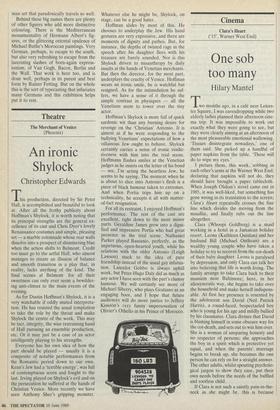Theatre
The Merchant of Venice (Phoenix)
An ironic Shylock
Christopher Edwards
This production, directed by Sir Peter Hall, is accomplished and beautiful to look at. After all the frothy publicity about Hoffman's Shylock, it is worth noting that its principal strengths are the general ex- cellence of its cast and Chris Dyer's lovely Renaissance costumes and simple, pleasing set — a marble colonnade whose rear walls dissolve into a prospect of shimmering blue when the action shifts to Belmont. Credit too must go to the artful Hall, who almost manages to create an illusion of balance and smooth transition in a play that, in reality, lacks anything of the kind. The final scenes at Belmont for all their sweetness can only ever seem a bewilder- ing anti-climax to the main events of the evening.
As for Dustin Hoffman's Shylock, it is a very watchable if oddly muted interpreta- tion. He has resisted the usual temptation to take the role by the throat and make Shylock the centre of the work. This may be tact, integrity, the wise restraining hand of Hall pursuing an ensemble production, etc. Or it may just be a case of an actor intelligently playing to his strengths.
Everyone has his own idea of how the part should be played — usually it is a composite of notable performances from the Romantic period down to our own. Kean's Jew had a 'terrible energy', was full of contemptuous scorn and fought to the last. Irving played on Shylock's evil and on the persecution he suffered at the hands of Christian Venice. More recently we have seen Anthony Sher's gripping monster. Whatever else he might be, Shylock, on stage, can be a good hater.
Hoffman slides by most of this. He chooses to underplay the Jew. His hand gestures are very expressive, and there are moments of dignity and pathos. But, for instance, the depths of twisted rage in the speech after his daughter flees with his treasure are barely sounded. Nor is this Shylock driven to misanthropy by daily insults at the hands of Venetian merchants. But then the director, for the most part, underplays the cruelty of Venice. Hoffman wears an ironic smile, he is watchful but resigned. As for the intimidation he suf- fers, we have a sense of it through the simple contrast in physiques — all the Venetians seem to tower over the tiny actor.
Hoffman's Shylock is more full of quick sardonic wit than any burning desire for revenge on the 'Christian' Antonio. It is almost as if he were responding to the bullying Venetians' expectations of how a villainous Jew ought to behave. Shylock certainly carries a sense of ironic vindic- tiveness with him into the trial scene. Hoffmann flashes smiles at the Venetian judges as he insists on the letter of his bond — see, I'm acting the heartless Jew, he seems to be saying. The moment when he is about to slice into Antonio's flesh is a piece of black humour taken to extremes. And when Portia trips him up on a technicality, he accepts it all with matter- of-fact resignation.
For all its restraint, I enjoyed Hoffman's performance. The rest of the cast are excellent, right down to the most minor parts. Geraldine James grew into a digni- fied and impressive Portia who had great presence in the trial scene. Nathaniel Parker played Bassanio, perfectly, as the impetuous, open-hearted youth, while his relations with the older Antonio (Leigh Lawson) stuck to the idea of pure friendship instead of the usual gay infatua- tion. Lancelot Gobbo is always uphill work, but Peter-Hugo Daly did as much as any actor I have seen with the part's clumsy humour. We will certainly see more of Michael Siberry, who plays Gratiano as an engaging boor, and I hope that future audiences will do more justice to Jeffery Kissoon's very funny impersonation of Olivier's Othello in his Prince of Morocco.


























































 Previous page
Previous page